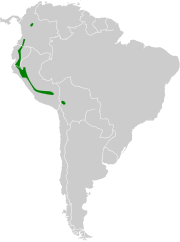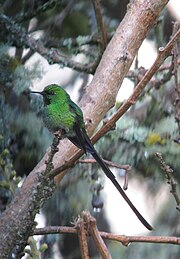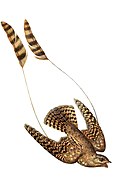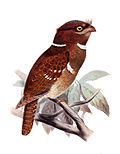Trainbearer
| Trainbearer | |
|---|---|

| |
| Black-tailed trainbearer, Lesbia victoriae | |
| Scientific classification | |
| Domain: | Eukaryota |
| Kingdom: | Animalia |
| Phylum: | Chordata |
| Class: | Aves |
| Clade: | Strisores |
| Order: | Apodiformes |
| Family: | Trochilidae |
| Tribe: | Lesbiini |
| Genus: | Lesbia Lesson, 1833 |
| Type species | |
| Ornismya nuna Lesson, 1832 | |
| Species | |
|
L. victoriae | |
Lesbia is a small genus of hummingbird. Its two members, both known as trainbearers, are found in tropical South America. They are:[1]
| Common name | Scientific name and subspecies | Range | Size and ecology | IUCN status and estimated population |
|---|---|---|---|---|
| Black-tailed trainbearer | Lesbia victoriae (Bourcier & Mulsant, 1846) |
Colombia, Ecuador, and Peru
|
Size: Habitat: Diet: |
LC
|
| Green-tailed trainbearer | Lesbia nuna (Lesson, 1832) |
Bolivia, Colombia, Ecuador, Peru, and Venezuela
|
Size: Habitat: Diet: |
LC
|
References
- ^ Gill, Frank; Donsker, David; Rasmussen, Pamela, eds. (July 2020). "Hummingbirds". IOC World Bird List Version 10.2. International Ornithologists' Union. Retrieved 2 January 2020.
- ^ Weller, André-A; Schuchmann, Karl-L. "Biogeographic and taxonomic revision of the trainbearers Lesbia (Trochilidae), with the description of two new subspecies" (PDF). Ornithol. 43.
External links
- "Lesbia R. Lesson, 1833". ITIS.











